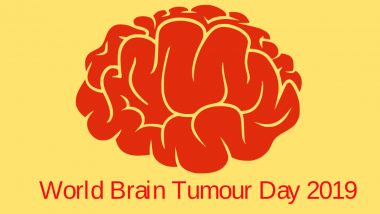World Brain Tumour Day is observed every year on June 8 by brain tumour support groups to raise public awareness about the disease and to improve detection. The day was first observed by the German Brain Tumour Association, founded in 1998. The association announced the world’s first Brain Tumour day on June 8, 2000, with a view to educate people about the life-threatening disease. The significance of World Brain Tumour Day is to draw global attention towards the problem and to encourage more research and funding into the topic. Finding treatment for brain tumour will save many lives each year. On World Brain Tumour Day 2019, here are the symptoms and risk factors of brain tumour. Girl’s Brain Tumour Disappears Miraculously, Doctors Baffled How At The Sudden Vanishing of The Disease.
What is Brain Tumour?
Brain tumour refers to a clump of abnormal cells that originate in the organ. These cells are not of any use to the body. Instead, they interfere with the workings of the brain.
There are two types of brain tumours – benign and malignant. Benign tumours do not spread to other parts of the body and are localised. But malignant tumours grow faster and invade the surrounding tissues. Did God and Prayers Make Man’s Brain Tumour Disappear Without Surgery? 'Faith Healing' Could Be Behind The Miracle.
What are the Symptoms of Brain Tumour?
The warning signs of brain tumour depend largely on the part of the organ where the mass develops. For example, if it develops in the frontal lobe of the brain, the person’s speech and communication abilities will be affected. Some common symptoms of brain tumour include:
• Headache
• Seizures
• Vomiting in the morning
• Vision problems
• Mental changes
• Mobility problems
• Speech difficulties
• Confusion
• Hearing problems
• Loss of sensation in hands or legs
• Inability to balance
• Inability to move
What are the Risk Factors of Brain Tumour?
• Some factors can make a person more predisposed to brain tumours than the others. These include:
• Family history of brain tumour
• Age (children are more at risk than adults)
• Gender (men are more at risk than women)
• Exposure to radiation
• Exposure to pesticides
• Exposure to virus (Epstein-Barr virus), allergens and infections
• Exposure to electromagnetic fields
• Head injury and seizures
• N-Nitroso compounds in food
Brain tumour can be life-threatening but completely treatable. Possible treatment options for brain tumor include surgery, radiotherapy, chemotherapy, steroid treatment, anti-seizure medication, etc.
(The above story first appeared on LatestLY on Jun 08, 2019 09:00 AM IST. For more news and updates on politics, world, sports, entertainment and lifestyle, log on to our website latestly.com).













 Quickly
Quickly


